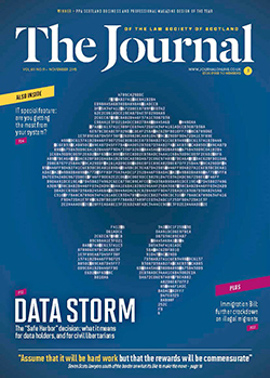Scottish Solicitors Discipline Tribunal
Lynsey Ann McLean
A complaint was made by the Council of the Law Society of Scotland against Lynsey Ann McLean, solicitor, Falkirk. The Tribunal found the respondent not guilty of professional misconduct and remitted the complaint to the Society in terms of s 53ZA of the Solicitors (Scotland) Act 1980.
There was a secondary complainer in the case, Simon John Black Hutchison, Hutchison Law, Falkirk, with whom the respondent had been in partnership. The Tribunal heard evidence over a number of days from a number of witnesses including the respondent and the secondary complainer. It generally preferred the evidence of the respondent to that of the secondary complainer. In this
The Tribunal is not indicating that it is in order for solicitors to embark on removing files from partnership offices, either before or during a dissolution of a partnership. But where a partner through their conduct indicates that they are not prepared to be bound by their obligations as a partner, this destroys the required trust and confidence that must exist in a partnership and it is difficult to expect that the innocent partner should act with propriety to the benefit of the partner who acts improperly, provided always that the client’s interests are protected and any real risk to clients is properly managed and controlled. Any individual
Solicitor B
A complaint was made by the Council of the Law Society of Scotland against solicitor B. The Tribunal found the respondent guilty of professional misconduct in respect of his entering into a sexual relationship with a vulnerable client referred to him by Organisation 1 and his acting in a manner that raised issues as to his trustworthiness and placed into question his personal and/or professional integrity; and in respect of his entering into a sexual relationship with a client who was vulnerable thereby allowing his independence to be impaired, failing to act in the best interests of his client, allowing his own personal interests to influence his actings on behalf of his client, creating a potential conflict of interest situation and failing in his duty of utmost trust and confidence. The Tribunal censured the respondent and
The Tribunal found this to be a difficult case and considered its decision on sanction very carefully. It noted that the complaint from the client was not raised until the relationship had ended.
Having found the respondent guilty of professional misconduct and that Organisation 1 was directly affected, the Tribunal directed that the respondent
As the matter had had a high profile in the local area and the Tribunal considered there was a real risk that further publicity would adversely affect the client and her children as well as Organisation 1, in the exceptional circumstances it ordered that the parties’ names be not publicised.
www.ssdt.org.ukIn this issue
- Appropriate adults and defence agents: who does what?
- Buying from a housing association: why consent matters
- Harassment: a civil claim?
- A welcome abroad: EYBA in London
- Reading for pleasure
- Opinion: David Faith
- Book reviews
- Profile
- President's column
- ScotLIS gets the green light
- People on the move
- Storm over Safe Harbor
- Light on a murky world
- Southern horizons
- Mediation minefield
- Migrants: no way to turn?
- The technological edge
- As our suppliers see us
- More rules to grapple with
- Fraud and divorce – a Scottish Sharland?
- What future for employment tribunal fees?
- Heading for a showdown on hard won human rights?
- Taxing question of relief
- Scottish Solicitors Discipline Tribunal
- How far can we rely on the register?
- All part of the game
- Law reform roundup
- From the Brussels office
- Poverty: a new front in the war
- Damage limitation: working it out
- Ask Ash
- A lawyer's lament
- Appreciation: Michael Scanlan






